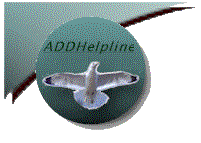
ADDHelpline is your ADD Information Source
*~*~*~*~*~*~*~*~*~*~*
*~*~*~*~*~*~*~*~*~*~*
ADHD Health Library Updated videos and information on ADD/ADHD brought to you by Healthology.
*~*~*~*~*~*~*~*~*~*~*
When
a high school student lacks the motivation to complete his schoolwork, we need
to look not only at him but at the reasons behind the lack of motivation.
Self-esteem issues can plague individuals with ADHD. There are many causes but there is help.
PARENT TO PARENT
CAN YOU HELP??
This month, a short and to the point question about disciplining children
Last Month: A mother is looking for ways to help her teenage son deal with anger.
Special Section: Mini EBook for Day Care Providers and Preschool Teachers on ADHD in Preschool
What
Is ADD/ADHD
The DSM-IV, cites the following as criteria for the diagnosis of ADD/ADHD:
INATTENTION
(need 6 of 9)
| often fails to give close attention to details or makes careless mistakes in schoolwork, work or other activities | |
| often has difficulty sustaining attention in tasks or play activities | |
| often does not seem to listen when spoken to directly | |
| often does not follow through on instructions and fails to finish schoolwork, chores, or duties in the workplace (no if oppositional behavior or doesn’t understand instructions) | |
| often has difficulty organizing tasks and activities | |
| often avoids, dislikes, or is reluctant to engage in tasks or activities that require sustained mental effort (such as schoolwork or homework) | |
| often loses things necessary for tasks or activities (e.g., toys, school assignments, pencils, books, or tools) | |
| often easily distracted by extraneous stimuli | |
| often forgetful in daily activities |
HYPERACTIVITY-IMPULSIVITY
(need 6 of 9)
| often fidgets with hands or feet or squirms in seat | |
| often leaves seat in classroom or in other situations in which remaining seated is expected | |
| often runs about or climbs excessively in situations in which it is inappropriate (in adolescents or adults, may be limited to subjective feelings of restlessness) | |
| often has difficulty playing or engaging in leisure activities quietly | |
| is often "on the go" or often acts as if "driven by a motor" | |
| often talks excessively | |
| often blurts out answers before questions have been completed | |
| often has difficulty awaiting turn | |
| often interrupts or intrudes on others (e.g., butts into conversations or games) |
REQUIREMENTS
| Present at least 6 months, maladaptive and inconsistent with development level |
| Some symptoms that caused impairment were present before age 7 |
| Some impairment from the symptoms is present in two or more settings (e.g., at school {or work} and at home) |
| There must be clear evidence of clinically significant impairment in social, academic or occupational functioning |
(DSM IV - May 26, 1999)
This criteria, however, is mostly for children over the age of 7 years old. Some doctor’s are reluctant to diagnose a child younger than school age as many children have not yet experienced a situation in which sustained attention and sitting quietly for extended periods of time is called for. Additionally, younger children can be extremely active, curious and have a short attention span and still fall within developmental guidelines.
Diagnostic criteria require that a child be affected by the above behaviors in at least two settings, normally home and school. This is to rule out environmental factors causing a behavioral problem.
Although there is a set diagnostic criterion for ADD/ADHD, there is not a “typical” ADD/ADHD child. Each child can exhibit different ADD characteristics and in different severities. Therefore, while one child with ADHD may be hyperactive and not able to sit still for more than a moment, another child may be less hyperactive and more inattentive.
With younger children it is important for a diagnosis to be made by a mental health specialist. A strong understanding of deviations from the developmental stages is necessary to determine if a child is simply growing at their own pace or having difficulties with a certain area of development.
 ADDHelpline,
Inc. is an online resource center and support group for all
individuals dealing with ADD/ADHD.
ADDHelpline,
Inc. is an online resource center and support group for all
individuals dealing with ADD/ADHD.